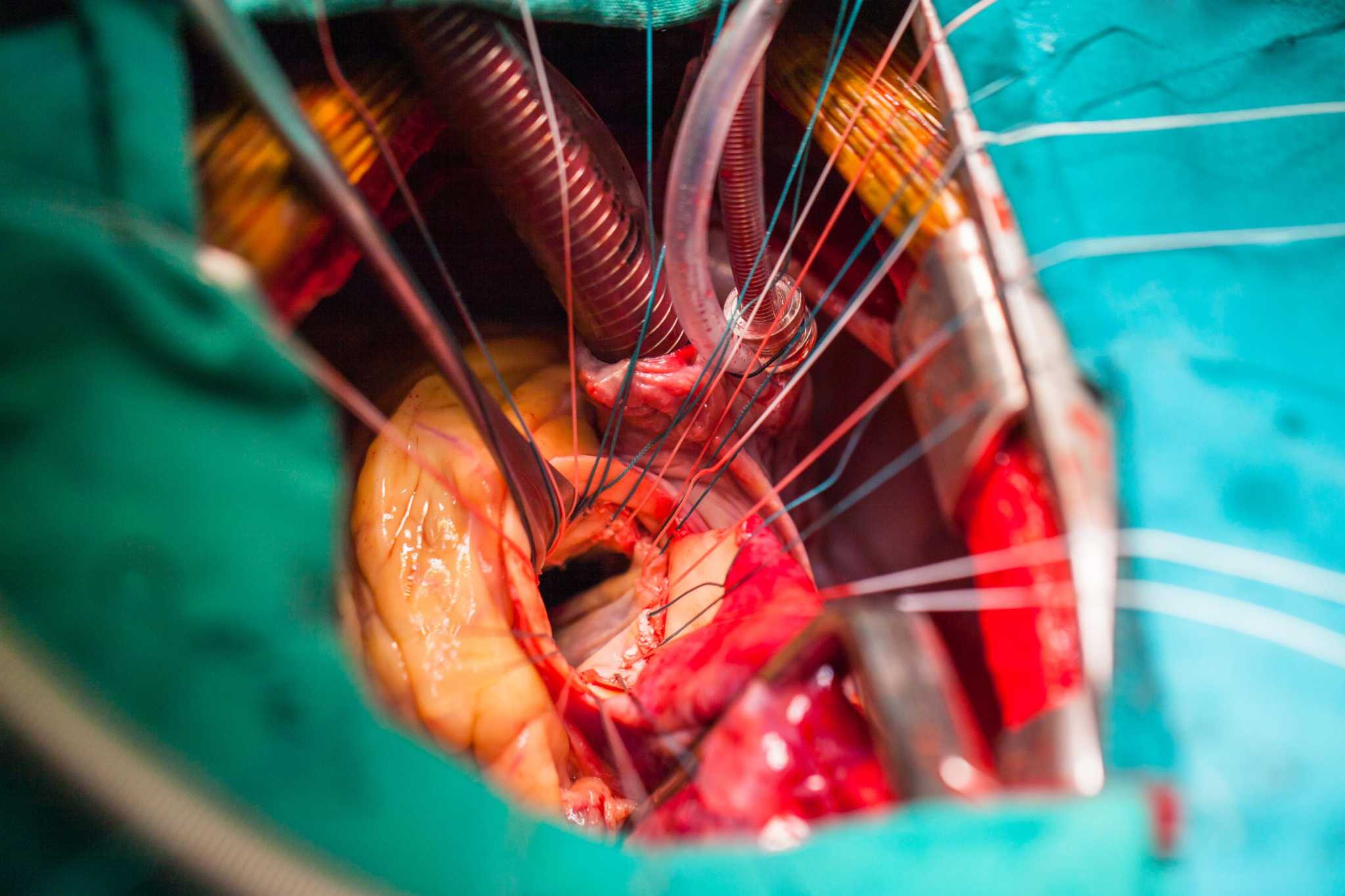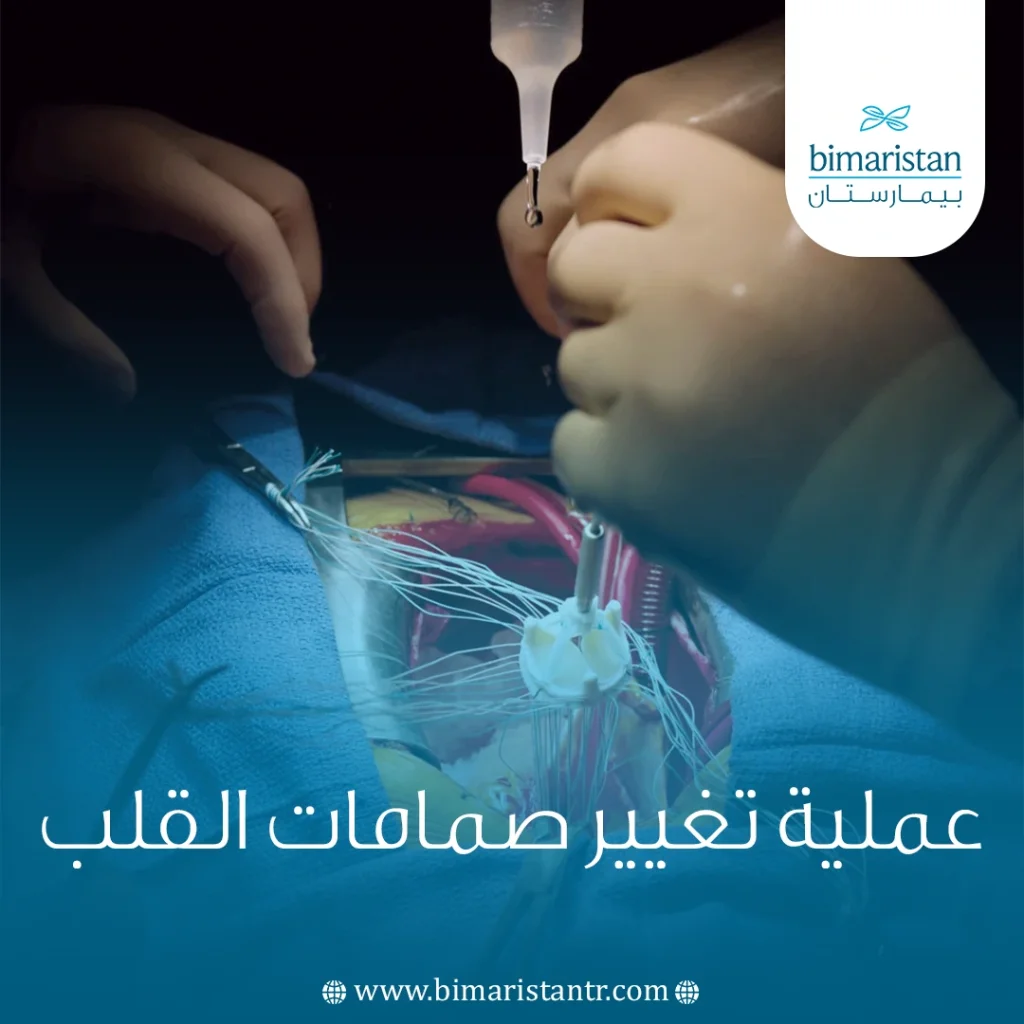تعتبر عملية تغيير صمامات القلب العلاج النهائي لأمراض وأذيات الصمامات القلبية، وقد ساهمت في إنقاذ العديد من مرضى القلب في تركيا بفضل جهود نخبة من الأطباء.

لمحة عن صمامات القلب
إن الصمامات القلبية صغيرة ولكنها شديدة الأهمية، فهي تتحكم بتدفق الدم من وإلى القلب، وإذا لم تعمل هذه الصمامات بكفاءة سيكون من الصعب على القلب العمل بشكل جيد وسيؤثر ذلك على صحة الجسم بشكل عام.
أحياناً تكون أمراض الصمامات القلبية خلقية وأحياناً تكون بسبب الإنتان وأحياناً لا يوجد سبب واضح للمشكلة، ولأن مشاكل الصمامات القلبية تعتبر أكثر شيوعاً مع التقدم بالعمر يعتقد الأطباء أن للعمر دور في حدوثها.
إن معالجة أمراض الصمامات القلبية قد تغيرت بشكل وملحوظ خلال السنوات العشر الأخيرة، وإن الإجراءات متعددة الاختصاصات في التشخيص والعلاج تهدف إلى تقديم العلاج الأمثل لكل مريض، وهذا يتضمن العلاج بالقسطرة وجراحة القلب بالمنظار بالإضافة إلى عمليات القلب المفتوح التقليدية لإصلاح أو تغيير صمامات القلب.

آلية عمل صمامات القلب
إن القلب هو المضخة التي تحافظ على تدفق الدم في كل أنحاء الجسم باستمرار، وأثناء عبور الدم خلال الصمام فإن وريقات الصمام تؤدي دور بوابات صغيرة تفتح لتسمح للدم بالعبور إلى حجرات القلب وتغلق لتمنع الدم من العبور بالاتجاه المعاكس.
هنالك أربعة صمامات في القلب، أي خلل في وظيفة أحد هذه الصمامات قد يكون قاتلاً لأنه يثبط تدفق الدم ويؤدي إلى جلطات دموية ونوبات قلبية وسكتات دماغية.

أعراض وعلامات أمراض الصمامات القلبية
إن العلامة الأولى لأي مشكلة صمامية هي النفخة القلبية أو عدم انتظام ضربات القلب التي يسمعها الطبيب باستخدام السماعة الطبية، ومع ذلك فإن وجود نفخة قلبية لا يشير بالضرورة إلى مشكلة صمامية.
تتضمن أعراض مشاكل الصمامات القلبية التعب والدوخة والإغماء والزلة التنفسية وزيادة الوزن المفاجئة وانتباج أوردة العنق والوذمة في الكاحلين أو في مناطق أخرى من الجسم.
يمكن للأدوية والتغييرات في نمط الحياة أن تساعد على تجنب القيام بالجراحة لعلاج المشكلة الصمامية، ولكن معظم الناس سيحتاجون إلى إجرائها اعتماداً على العمر والصحة العامة والأعراض التي قد تصبح شديدة.
عملية تغيير صمامات القلب في تركيا
إن عملية تغيير صمامات القلب valve replacement surgery تتطلب في معظم الحالات إجراء عملية قلب مفتوح، وهذا يعني أن الجراح يقوم بفتح الصدر ثم فتح القلب لإزالة الصمام المتأذي، وفي بعض الأحيان يمكن تغيير الصمام بإجراء شق صغير قرب عظم القص أو تحت العضلة الصدرية اليمنى وهذا يسمى جراحة القلب المحدود التدخل.
وقد أشارت الدراسات إلى ارتفاع نسبة نجاح عملية تغيير صمامات القلب، حيث كان معدل البقيا لخمس سنوات بعد العملية 94% بالنسبة للصمام الأورطي و 64% بالنسبة للصمام التاجي، والجدول التالي يوضح معدل البقيا بعد إجراء عملية تغيير صمامات القلب بمختلف أنواعها:
| عملية تغيير صمامات القلب | معدل البقيا لخمس سنوات | معدل البقيا لعشر سنوات |
| عملية تغيير الصمام الأبهري | 94% | 84% |
| عملية تغيير الصمام التاجي | 64% | 37% |
| عملية تغيير الصمام الرئوي | 96% | 93% |
| عملية تغيير الصمام ثلاثي الشُّرف | 79% | 49% |
أسباب إجراء عملية تغيير صمام القلب
يجب إجراء عملية تغيير صمامات القلب عندما يصاب أحد الصمامات بمرض أو أذية تمنعه من الانفتاح بشكل جيد (تضيق الصمام) أو تمنعه من الانغلاق بشكل جيد (قصور الصمام) ولأن ذلك يعيق عمل القلب في ضخ الدم.
تهدف عملية تغيير صمام القلب إلى استبدال صمام القلب التالف بصمام بديل يقوم بعمل الصمام الأساسي في الفتح والإغلاق ويخفف العبء على عضلة القلب.
آلية عمل الصمامات البديلة
تقوم الصمامات البديلة بدور بوابات تسمح للدم بالعبور باتجاه واحد فتفتح في الوقت المناسب وتغلق في الوقت المناسب، مما يسمح للقلب بالضخ بشكل فعال دون أن يعود الدم بالاتجاه المعاكس.
أنواع الصمامات البديلة واختيار النوع الأمثل
هنالك نوعين رئيسيين لبدائل الصمامات صنعية وحيوية، وإن اختيار أحد هذين الصمامين يتأثر بعدة عوامل كالعمر والأمراض المرافقة ورغبة المريض.
الصمامات القلبية الحيوية: يتم الحصول على هذه الصمامات من جثة بشرية أو من الحيوانات، وهي لا تتطلب تناول مميعات الدم إذا لم يكن هناك استطباب آخر لتناولها عند المريض، لذلك فهي أنسب للمرضى المسنين والحوامل والرياضيين، والأشخاص الذين يملكون صمامات حيوية لديهم خطورة أقل لحدوث الجلطات الدموية، لكن هذه الصمامات أقل تحملاً فهي بحاجة إلى تغيير كل 12 إلى 15 سنة.
الصمامات القلبية الصنعية: يتم صنع هذه الصمامات من الكربون والمعدن، ولأنها تعتبر الأكثر تحملاً فهي تستخدم عند المرضى الأصغر سناً (أقل من 65 سنة)، لكن الأشخاص الذين يملكون صمامات صنعية يتحتم عليهم تناول الأدوية المميعة للدم كالوارفارين مدى الحياة لأن لديهم خطورة عالية لتشكل الجلطات الدموية، لذا فإن الصمامات الحيوية غير مناسبة للحوامل ولا للرياضيين المعرضين للإصابة والنزف.

مخاطر عملية تغيير صمامات القلب
كما في أي عملية جراحية هنالك مخاطر من التخدير ومخاطر من العملية نفسها، وتعتمد درجة الخطورة على العمر والمشاكل الصحية للمريض.
تتضمن مضاعفات عملية تغيير صمام القلب:
- الإنتان
- تشكل الجلطات الدموية
- النشبات الدماغية
- عدم انتظام ضربات القلب
- قصور وظيفة الكلية لعدة أيام
نسبة الوفيات في عملية تغيير الصمام الأبهري تتراوح بين 1 و2 بالمئة والتي تعتبر أقل بكثير من خطورة تركه بدون علاج، أما في عملية استبدال صمام القلب التاجي فتتراوح نسبة الوفيات بين 2 و6 بالمئة، ومعظم الأشخاص الذي أجروا هذه العملية بنجاح كان لديهم متوسط عمر قريب من المعدل الطبيعي.
طريقة إجراء عملية تغيير صمامات القلب في تركيا
الإجراء التقليدي يتضمن فتح الصدر وقطع عظم القص للوصول إلى منطقة الصمّام، يجب إيقاف القلب أثناء استبدال الصمام لذا يوضع المريض على جهاز المجازة القلبية الرئوية للمحافظة على دوران الدم في الجسم أثناء العملية، وهي عملية معقدة جداً.
في هذه الأيام يمكن إجراء جراحة القلب بالمنظار (طفيفة التوغل) من أجل تغيير صمام القلب، أو حتى زرع الصمام بواسطة القسطرة TAVI عند المرضى المناسبين.

يختلف الإجراء من مريض لمريض ويستغرق على الأقل ساعتين، ويتم وضع المريض تحت التخدير العام خلال العملية.
يزيل الطبيب أي نسيج أو بقايا متكلسة تعيق العمل الطبيعي للصمام وقد يزيل الصمام المتخرب بأكمله، ثم يخيط الصمام الجديد مكان الصمام القديم.
بعد أن يتأكد الطبيب من أن الصمام الجديد يعمل بشكل جيد سيعيد تدفق الدم إلى القلب ويفصل المريض عن جهاز المجازة القلبية الرئوية ويغلق الشق الجراحي.
وتجدر الإشارة إلى أن جميع الصمامات البديلة متوافقة حيوياً أي أن الصمام الجديد لن يرفضه الجهاز المناعي للمريض.
بعد العملية سيتم نقل المريض إلى وحدة العناية المشددة لبعض الوقت حيث ستتم مراقبة علاماته الحيوية عن كثب والتأكد من عدم حدوث الاختلاطات، قد يشعر المريض بعدم الارتياح قليلاً لكثرة أجهزة المراقبة الموصول عليها.
عندما تصبح العناية المشددة غير ضرورية يتم نقل المريض إلى غرفة عادية في المستشفى لمدة 3 إلى 10 أيام اعتماداً على سرعة شفاء المريض.
الحياة بعد تغيير صمامات القلب
بعد إجراء عملية تغيير صمام القلب ستتم مساعدة المريض ليتمكن من السير على قدميه مجدداً، العديد من المرضى يعودون إلى المنزل في غضون حوالي أسبوع.
وسطياً يستغرق الأمر شهرين إلى ثلاثة أشهر ليتعافى المريض بشكل كامل لكن ذلك يختلف بشكل واسع تبعاً لحالة المريض ونوع الجراحة التي أجراها.
إجراء الجراحة التقليدية قد يتطلب وقت أطول للشفاء، بينما إجراء عملية تغيير صمام القلب عن طريق القسطرة لا يحتاج إلى وقت طويل ليتم الشفاء.
يجب أن تتحسن نوعية حياة المريض بشكل عام بعد إجراء العملية بسبب زوال المشكلة الصمامية وعودة وظيفة القلب الطبيعية، سيوضح الأطباء للمريض كيفية البدء بالتمارين الرياضية تدريجياً.
ومن الضروري أن يخضع المريض لإعادة التأهيل القلبي حيث يتم مساعدته على التمرن بأمان وتقديم الدعم النفسي والنصائح حول الأدوية ونوعية الأغذية التي يجب عليه تناولها للمساعدة على الشفاء بأسرع وقت.
لماذا أختار العلاج في تركيا؟
في الآونة الأخيرة أصبحت تركيا من الدول الرائدة في مجال السياحة العلاجية على مستوى العالم.يعود السبب وراء ذلك إلى وجود مراكز طبية مُتطورة توفّر العلاج المناسب على يد أمهر الأطباء و احدث الأجهزة الطبية وبتكلفة قليلة.ويبقى مركز بيمارستان الطبي هو خيارك الأول للعلاج في تركيا.نرشدك ل أفضل الأخصّائيين الخبراء بكافة الأقسام.نسهّل لغة التواصل بينك وبين الجميع عن طريق أطباء عرب متخصصين سيساعدونك في التواصل مع طبيبك.نساعدك في تأمين العلاج المناسب والخدمة الراقية في أحدث المشافي و افضل مراكز العمليات الطبية في تركيا.نقدم خدماتنا على امتداد كبير وبشكل دقيق.نرافقك خطوة بخطوة نحو الشفاء.استشارات مجانية على مدار الساعة.لا تتردد بالتواصل معنا، مركز بيمارستان عائلتك في تركيا.

